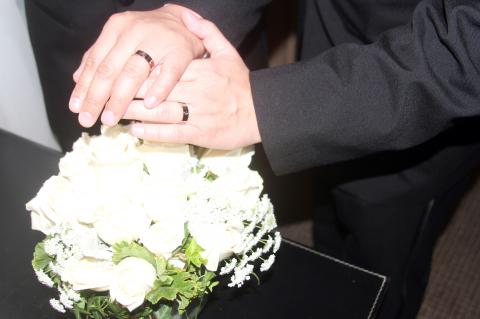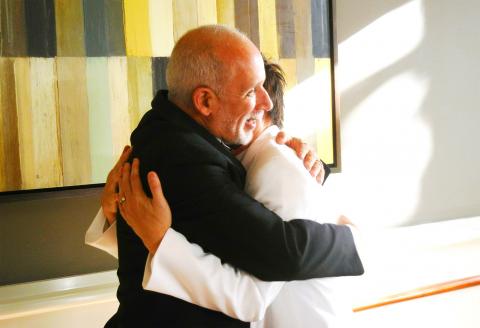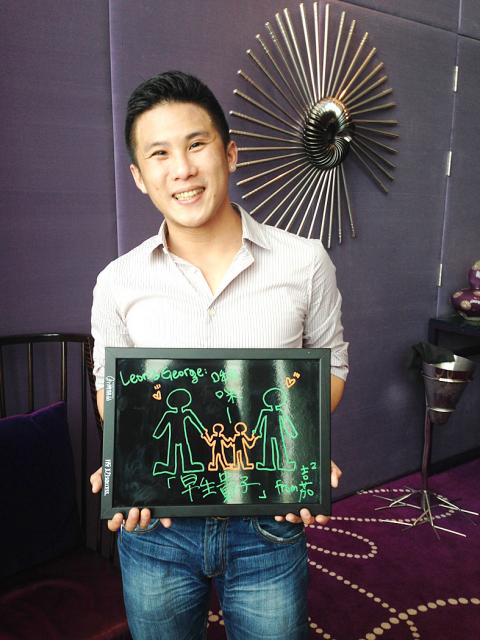Earlier this year, I attended the wedding of my schoolmate at a five-star hotel in Taipei. Just like any other wedding, this one was filled with much laughter and tears of joy. The only exception was that this wedding was between two men.
“After being together for a long time, our desire for a home had grown stronger and stronger. So this is a dream come true,” said the man, surnamed Shih (石), who wishes to remain anonymous.
In 1999, Shih met his “Mr. Right” while studying at a university in San Francisco. Although he returned to Taipei after graduation, their romance continued. After keeping the long-distance relationship for almost 15 years, they eventually married in the US and held a public wedding in Taiwan.

Photo: Eddy Chang, Taipei Times
“Since holding a gay wedding was unimaginable in the past, we originally didn’t dare to pursue this dream. But after witnessing some gay friends marrying in the US, we started to discuss the possibility of getting hitched,” Shih said.
“We also held the banquet publicly to please our parents... which symbolized that their kids have grown up and are moving toward the next stage in their lives. We just wanted to prove that this relationship was serious, and stop our parents from worrying,” he added.
Rob Lo (羅毓嘉), a gay writer, was tearful during the event because it reminded him how grateful he was for his own family’s unconditional love and support.

Photo courtesy of the Taiwanese groom, surnamed Tsai
“Wouldn’t the world be a better place if every homosexual could grow up in a caring and supportive family without being bullied or discriminated against?” he said. “I was deeply moved by the wedding, especially when the couple offered tea to their parents during the tea-offering ceremony. How wonderful it was for them to receive the blessing from both families,” he added.
THE REALITY
Unfortunately, same-sex marriage is not legally recognized in Taiwan, although studies show that the percentage of people who identify themselves as lesbian, gay, bisexual or transgender (LGBT) is around 3.5 to 5 percent of the population. In other words, among the 23.4 million Taiwanese, up to around 1.2 million non-heterosexuals are deprived of their right to marry on the basis of their sexuality.

Photo: Eddy Chang, Taipei Times
In the past, homosexuality was a taboo in Taiwan. But recent polls show that attitudes are changing. Last year, a poll conducted by Academia Sinica showed that 52 percent of those polled support gay marriage, while a poll conducted by the Taiwan Alliance to Promote Civil Partnership Rights showed that 53 percent support it. A 2011 CommonWealth Magazine poll even showed that 67 percent support same-sex unions. And since support is much higher among Taiwan’s younger generation, it’s just a matter of time before a same-sex marriage bill is passed.
GAY RIGHTS ARE HUMAN RIGHTS
However, opposition remains, most apparent with last year’s rally against revising Article 972 of the Civil Code — which would change the term “man and woman” to “two parties” in the article concerning marriage and the term “father and mother” to “parents” in the Civil Code — when religious groups mobilized tens of thousands to protest in front of the Presidential Office. They claimed that same-sex unions will threaten human society and family values. It’s an argument that Shih disputes.
“A marriage brings greater responsibility. It is the union of two families after all, not just the people getting married, and I have become more mature and responsible. I finally have a real home,” he said.
Advocates of same-sex marriage also point to Article 7 of Taiwan’s Constitution, which states: “All citizens, irrespective of sex, religion, race, class or party affiliation, shall be equal before the law.” Taiwan’s ban on gay marriage, Shih says, is clear a violation of the spirit of the constitution.
And legal recognition of same-sex couples is necessary because only by allowing gay couples to legally form families can they enjoy the rights and privileges afforded to all married “straight” couples — such as property inheritance rights, hospital visitation rights, the right to make medical or healthcare decisions on behalf of one’s partner, custody of children and greater access to insurance and credit, among other benefits.
In 2007, for example, Edith Windsor and Thea Spyer, having been in a relationship for 40 years, were lawfully married in Canada. Spyer died soon after and left her entire estate to Windsor. But the US government denied Windsor’s claim for estate tax exemption for surviving spouses, forcing her to pay US$363,053 (about NT$11.1 million) in estate taxes. Eventually, the US Supreme Court ruled that married gay couples are entitled to the same federal benefits as married heterosexual couples.
“For us, obtaining legal protection is most important,” said a Taiwanese gay man, surnamed Tsai (蔡), who married his partner in the US in 2012. He said that their unmarried gay friends did not even have hospital visitation rights when their partners fell ill.
“Now, we enjoy insurance coverage, joint tax returns and other rights given to legal spouses,” Tsai said.
MARRIAGE EQUALITY
Taiwan’s LGBT community and human rights activists have started to push for legal recognition of same-sex marriage over the past decade, and seven opposition legislators proposed three draft bills last year to promote “diverse family formation” (多元成家). Of the three, the first draft bill for marriage equality (婚姻平權草案) was the only one that passed the first reading at the Legislative Yuan. Still, the majority of legislators from both the ruling and opposition camps are opposed to it.
“All people are born equal, and the basic human rights of people with different sexual orientation should be protected too,” wrote Democratic Progressive Party (DPP) Legislator Hsiao Bi-khim (蕭美琴), who was one of those responsible for proposing the draft bills, in a newspaper editorial. “We cannot treat homosexuals as second-class citizens,” she added.
More recently, the Ministry of Education (MOE) caused much controversy by appointing anti-gay advocates recommended by Chinese Nationalist Party (KMT) Legislator Lai Shyh-bao (賴士葆) as new members of its Gender Equity Education Committee.
“Such amendments to the law would severely threaten traditional family values and ethics in Taiwan,” said Lai, who has tried hard to halt the amendments.
It’s a situation that David Wang (王大維), an assistant professor at National Pingtung University of Education and a member of the MOE’s committee, calls “absurd.”
“Certain members [of the committee] are critical of gay rights, even associating homosexuality with sexual deviance,” Wang said.
“How is it possible that the government appoints them to promote gender equality, when certain members have no respect for gender equality?” he said.
CHALLENGES TO GAY RIGHTS
Wang says Taiwan’s gay rights movement faces two challenges. The first is bias, discrimination and defamation — although such attacks have become subtler and gone partially underground. Plus, the challenge regarding religious extremists’ oppression of homosexuality is even more complex. They often abuse freedom of speech intentionally to spread “hate speech.”
“What’s worse is that some extremists often collude with political forces in order to achieve their purposes, such as distorting and boycotting gender equality education,” he said, urging officials not to be hijacked by religious groups.
“Marriage is neither a perfect system nor a lifetime guarantee for happiness. But it should not be a privilege for certain sections of the population,” said Wang, adding that gay marriage is simply harmless to straight marriage, and it can help homosexuals and their family members adapt to society better. “So I can’t think of any reason to oppose it.”
Shih said the legislature’s review of the draft bill for marriage equality at the current legislative session will serve as a litmus test.
He added: “Homosexuals in Taiwan also pay taxes, perform military service and fulfill all their social obligations — why can’t they be treated fairly?”

The canonical shot of an East Asian city is a night skyline studded with towering apartment and office buildings, bright with neon and plastic signage, a landscape of energy and modernity. Another classic image is the same city seen from above, in which identical apartment towers march across the city, spilling out over nearby geography, like stylized soldiers colonizing new territory in a board game. Densely populated dynamic conurbations of money, technological innovation and convenience, it is hard to see the cities of East Asia as what they truly are: necropolises. Why is this? The East Asian development model, with

June 16 to June 22 The following flyer appeared on the streets of Hsinchu on June 12, 1895: “Taipei has already fallen to the Japanese barbarians, who have brought great misery to our land and people. We heard that the Japanese occupiers will tax our gardens, our houses, our bodies, and even our chickens, dogs, cows and pigs. They wear their hair wild, carve their teeth, tattoo their foreheads, wear strange clothes and speak a strange language. How can we be ruled by such people?” Posted by civilian militia leader Wu Tang-hsing (吳湯興), it was a call to arms to retake

This is a deeply unsettling period in Taiwan. Uncertainties are everywhere while everyone waits for a small army of other shoes to drop on nearly every front. During challenging times, interesting political changes can happen, yet all three major political parties are beset with scandals, strife and self-inflicted wounds. As the ruling party, the Democratic Progressive Party (DPP) is held accountable for not only the challenges to the party, but also the nation. Taiwan is geopolitically and economically under threat. Domestically, the administration is under siege by the opposition-controlled legislature and growing discontent with what opponents characterize as arrogant, autocratic

Desperate dads meet in car parks to exchange packets; exhausted parents slip it into their kids’ drinks; families wait months for prescriptions buy it “off label.” But is it worth the risk? “The first time I gave him a gummy, I thought, ‘Oh my God, have I killed him?’ He just passed out in front of the TV. That never happens.” Jen remembers giving her son, David, six, melatonin to help him sleep. She got them from a friend, a pediatrician who gave them to her own child. “It was sort of hilarious. She had half a tub of gummies,